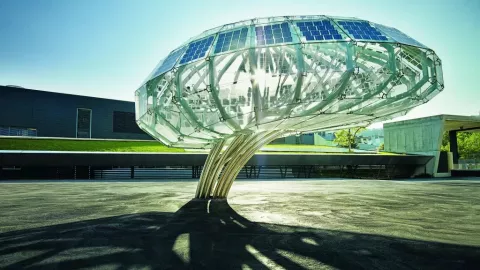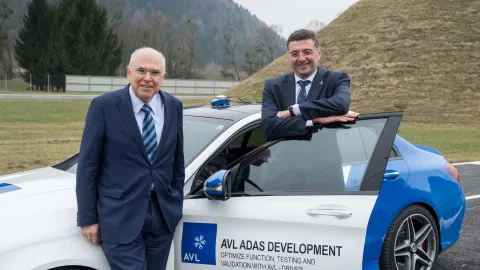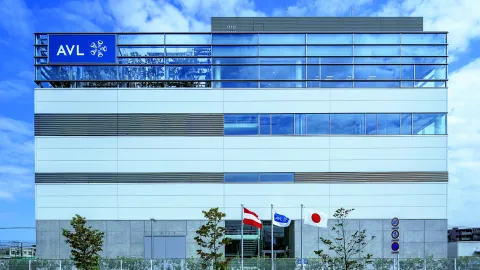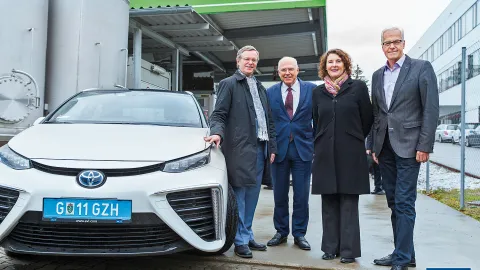Ford Otosan and AVL Continue Their Joint Development of Autonomous Driving Solutions with L4 Highway Pilot Project
- EN,
AVL and Ford Otosan take the next step in their long-term cooperation in the development of automated driving of trucks.

AVL and Ford Otosan take the next step in their long-term cooperation in the development of automated driving of trucks. Having successfully demonstrated truck platooning in Autumn 2019, the partners are now focused on highly automated driving on highways. The autonomous trucks that are being developed will have SAE L4 Highway Pilot technology that will eventually enable the logistics companies to deploy fully autonomous heavy-duty transportation between logistics hubs.
Lack of drivers worldwide and strong market demand for safer and more efficient transportation solutions, deems the business case for L4 Highway Pilot highly beneficial. The development effort is significant due to diverse weather conditions and various traffic situations that need to be covered to guarantee safe driving just as a human driver would do, yet with increased safety. Considering the number of possible scenarios, AVL and Ford Otosan started the development of an autonomous highway pilot system working on traffic scenarios that are more common and are gradually increasing the complexity of those scenarios. Two Ford Trucks F-MAX vehicles, equipped with best-in-class lidar, radar, camera sensors, and processing platforms are already on the roads in Turkey and Germany. These trucks are currently being used to collect data from the roads, which is then being used to train and test Artificial Intelligence-based perception and decision-making algorithms.
Ford Otosan and AVL will jointly develop the software stack specified for the SAE L4 Highway Pilot functionality using state-of-the-art approaches and development processes. Innovative and systematic verification-validation methodologies will be applied for highest maturity and safety of the developed automated driving features. AVL will specifically contribute with its comprehensive knowledge in software development by its engineering teams in Regensburg and Istanbul, and Ford Otosan will strengthen the project with its expertise in developing ADAS & Autonomous Driving systems for heavy-commercial vehicles.
Sharing his expectation for the SAE L4 Highway Pilot technology, Ford Otosan Assistant General Manager Burak Gökçelik stated: “In the second phase of our R&D cooperation we aim to develop and test SAE-Level 4 autonomous trucks that are designed to operate on highways for fully autonomous hub-to-hub transportation. By automating a significant portion of the heavy commercial transportation on the highways, Ford Trucks will create value for fleet owners, drivers, end customers, and the society with safer, faster, cheaper, greener, and more reliable transportation.”
Emphasizing the potential of automated H2H transport, AVL Executive Vice President Rolf Dreisbach pointed out the following: “The implementation of automated H2H transportation can scale down the operating costs by up to 30% and can contribute to a significant reduction in the number of accidents with trucks involved. We want to support our customers with AVL’s development strengths and innovative approaches to implement Automated Driving solutions for their best market positioning.”
In the first half of 2021, Ford Otosan and AVL aim to show the next major step in their successful cooperation toward the development of real H2H transportation.
About Ford Otosan
Ford Otosan, with its annual production capacity of 455,000 vehicles, 70,000 engines and 140,000 powertrains, is the biggest commercial vehicle production center of Ford in Europe. Company produces and develops Transit & Tourneo range commercial vehicles, and also serves as the global engineering & production centre for Ford Trucks heavy commercial vehicles and their engine systems. The company has all the capabilities and infrastructure required to design, develop, and test a whole vehicle, including its engine, from scratch to the complete commercial product. Ford Otosan (Ford Otomotiv Sanayi A.Ş.) is a publicly traded company, where Ford Motor Company and Koç Holding have equal shares. (www.fordotosan.com.tr/en)
AVL is a world-leading technology company specialising in development, simulation and testing in the automotive industry and other sectors such as rail, marine and energy. Through extensive research, AVL delivers concepts, technology solutions, methodologies and development tools for sustainable, safe and advanced mobility and beyond.
AVL supports international partners and customers in sustainable and digital transformation, with a focus on electrification, software, AI and automation. AVL also supports companies in energy-intensive sectors on their way to green and efficient energy generation and supply.
For more information: www.avl.com
![PR_AVL_CONCERTO_5_SANTORIN_MX2_Bild[2] PR_AVL_CONCERTO_5_SANTORIN_MX2_Bild[2]](/sites/default/files/styles/landscape_small/public/pressrelease/Company/PressReleases/Press%20Releases%202017/PR_AVL_CONCERTO_5_SANTORIN_MX2_Bild%5B2%5D_0.jpg.webp?itok=yFVZY0gr)
- EN,

- EN,

- EN,

- EN,
Stay up-to-date as a journalist with our latest press releases concerning company updates, research projects, our latest developments, and more.
Download our fact sheet to get a comprehensive overview about what we do as well as our latest company figures.
Get in touch with our Press-Team
For all press and media enquires please email: